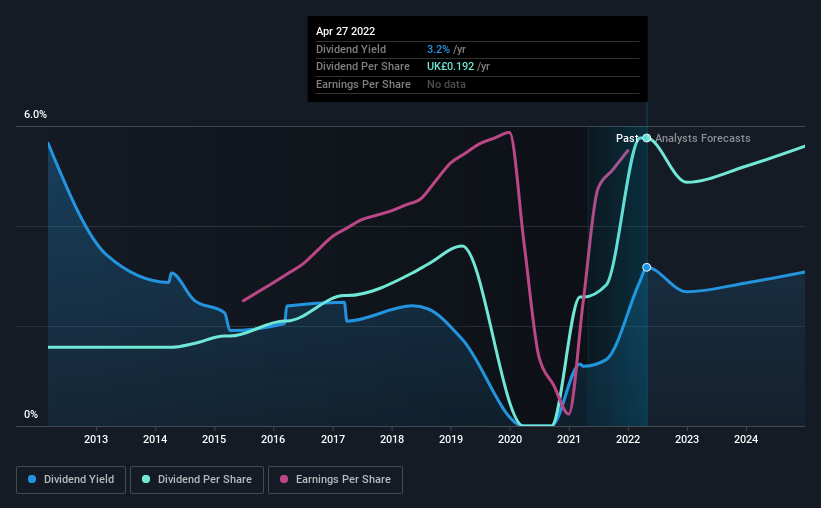Marshalls' (LON:MSLH) Dividend Will Be Increased To UK£0.096
Marshalls plc (LON:MSLH) has announced that it will be increasing its dividend on the 1st of July to UK£0.096. Although the dividend is now higher, the yield is only 2.4%, which is below the industry average.
See our latest analysis for Marshalls
Marshalls' Dividend Is Well Covered By Earnings
If it is predictable over a long period, even low dividend yields can be attractive. Marshalls was earning enough to cover the previous dividend, but it was paying out quite a large proportion of its free cash flows. The company is clearly earning enough to pay this type of dividend, but it is definitely focused on returning cash to shareholders, rather than growing the business.
Looking forward, earnings per share is forecast to rise by 21.5% over the next year. If the dividend continues along recent trends, we estimate the payout ratio will be 43%, which is in the range that makes us comfortable with the sustainability of the dividend.
Dividend Volatility
Although the company has a long dividend history, it has been cut at least once in the last 10 years. The dividend has gone from UK£0.052 in 2012 to the most recent annual payment of UK£0.19. This works out to be a compound annual growth rate (CAGR) of approximately 14% a year over that time. Despite the rapid growth in the dividend over the past number of years, we have seen the payments go down the past as well, so that makes us cautious.
The Dividend Has Growth Potential
Growing earnings per share could be a mitigating factor when considering the past fluctuations in the dividend. We are encouraged to see that Marshalls has grown earnings per share at 7.8% per year over the past five years. The company is paying a reasonable amount of earnings to shareholders, and is growing earnings at a decent rate so we think it could be a decent dividend stock.
Our Thoughts On Marshalls' Dividend
Overall, this is probably not a great income stock, even though the dividend is being raised at the moment. The low payout ratio is a redeeming feature, but generally we are not too happy with the payments Marshalls has been making. We would probably look elsewhere for an income investment.
Companies possessing a stable dividend policy will likely enjoy greater investor interest than those suffering from a more inconsistent approach. However, there are other things to consider for investors when analysing stock performance. As an example, we've identified 1 warning sign for Marshalls that you should be aware of before investing. If you are a dividend investor, you might also want to look at our curated list of high yield dividend stocks.
Have feedback on this article? Concerned about the content? Get in touch with us directly. Alternatively, email editorial-team (at) simplywallst.com.
This article by Simply Wall St is general in nature. We provide commentary based on historical data and analyst forecasts only using an unbiased methodology and our articles are not intended to be financial advice. It does not constitute a recommendation to buy or sell any stock, and does not take account of your objectives, or your financial situation. We aim to bring you long-term focused analysis driven by fundamental data. Note that our analysis may not factor in the latest price-sensitive company announcements or qualitative material. Simply Wall St has no position in any stocks mentioned.

 Yahoo Finance
Yahoo Finance 
